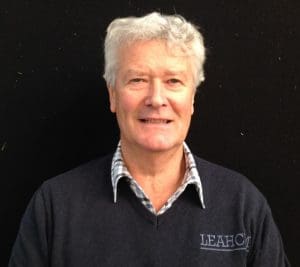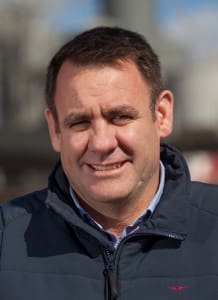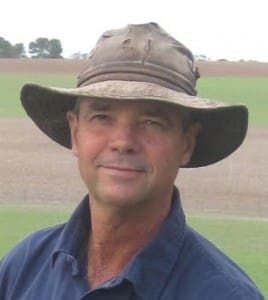
Leahcim Merino’s Andrew Michael
NON-MULESING flock owners should be able to declare the animal welfare status of lambs and sheep on Australia’s National Vendor Declaration, according to Merino and White Suffolk breeder Andrew Michael.
The current Livestock Production Assurance NVD is required for all livestock movements, including property to property, through saleyards, direct to processors and to feedlots, and to the live export trade.
Buyers can determine the age, origin and chemical treatment and quality assurance status of sheep and lambs with an NVD, but Mr Michael believes the document should also have a question asking whether animals have been mulesed or not.
The Michael family runs the Leahcim Merino and White Suffolk studs at Snowtown in South Australia. Mr Michael is also 10 months into his first term as a Meat & Livestock Australia director.
As a wool and sheep meat producer, Mr Michael said he supported having a mulesed/non-mulesed question on the NVD.
“I’m happy as a representative of our business at Snowtown, I think it is important that we have that traceability.
“I think as an MLA director I think that we have to look at the options to have it as fully transparent for our markets, for our consumers,” he said.
“Because there is no doubt in my mind that when we see now with the technologies that are there with a smart phone, in the future we can go to products in Japan, put that phone and it will give us the full story of that product from paddock to plate.
“We have to have that as an industry and we have customers overseas who are saying they want that full traceability,” he said.
“In the wool industry, people can buy wool that they know is from mulesed sheep, or people have signed a declaration that says wool is from unmulesed sheep – we don’t have that in the meat industry.
“We haven’t mulesed since 2004 and when we sell our prime lambs and our Merino lambs through a finishing system and I want to value-add that, I need genuine traceability – I can do that with wool, but I can’t do it with meat,” Mr Michael said.
“I just think it is one of the things that we need for our consumers again, for our customers, our purchasers.
“If one processing company wants to unmulesed lambs and the mothers of those are unmulesed, we can offer that,” he said.
“Our customers want that ability to differentiate and that’s what we need to offer.”
“If those people who want to continue to mules, that’s fine, but if there are premiums or markets out there that want unmulesed lambs, they can get them.
Mr Michael said mulesing is not just a wool marketing issue. He said he and two other SA producers met with JBS Australia 20 years ago, when company representatives said they couldn’t sign off on lamb for a potential European customer because they couldn’t prove that the lamb and the mothers of those lambs were unmulesed.
“So it was a contract that they lost.”
At the recent Jamestown Show inaugural Ag Industry Q & A, Mr Michael said he found it abhorrent that first cross ewes were still mulesed in Australia. First cross ewes are the major prime lamb dam choice in Australia and ewe buyers often discount by $20-$40 any unmulesed lines offered for sale. He said Australia must breed toward a non-mulesed flock.
Q & A panel member, SA Merino producer and a regional chair of the Southern Australian Meat Research Council, Jane Kellock, supported Mr Michael’s stance. She said her family’s Farrell Flat flock has not been mulesed for 10-12 years.
“It is unacceptable for our markets to have meat sheep that are being mulesed.”
Mr Michael said he has never said that producers should stop mulesing or that it should be banned.
“I think we should all breed towards it (non-mulesing), because I think inevitably something will happen and we need to be able to adjust when the time comes.
“But we need to cover pain relief and we also need the traceability of our products.”
Declaring sheep meat mulesing status is ‘risk management’ – Norton

MLA managing director Richard Norton
MLA managing director Richard Norton said he was aware Sheep Producers Australia had raised the issue of a mulesing declaration on the NVD with the Integrity Systems Co Taskforce.
“As prime lamb producers, we are in the global food industry.
“Global trends demonstrate consumers want information about the welfare of animals in the production system,” he said.
“Risk identification has clearly shown mulesing is unacceptable to consumers and a proactive industry would provide the traceability now as opposed to managing a future crisis.
“Risk management is about identifying the risks and managing them, a crisis is an outcome of poor risk identification,” Mr Norton said.
“Declaring mulesed or unmulesed is risk management.
“Ignoring the issue, hoping it will not go away, is naïve,” he said.
Mr Norton said SPA, as MLA’s legislated peak sheep industry council has declared that no prime lamb should be mulesed.
“MLA supports SPA’s position and the market will decide what happens in the future.
“We have known for over a decade about the EU supermarkets who will not take Australian lamb on the perception every sheep in Australia is mulesed, he said.
Mr Norton said market forces will decide whether a non-mulesed declaration on the NVD would help processors access certain markets.
Sheep Producers Australia to look at mulesing question

Sheep Producers Australia president Allan Piggott
Sheep Producers Australia president Allan Piggott said consideration of a mulesed/non-mulesed declaration on the NVD was on SPA’s “agenda”, but the body did not have a “stated position”.
“That’s one of the options we are looking at, yes,” he said.
“We are very mindful that consumers are asking the questions and when we consider the opportunities for free trade agreements with Europe and Britain, again, welfare and environmental issues, they will all be on the table.
“So it is something that we need to look at as an industry.”
Mr Piggott believed SPA had raised the issue with the Integrity Systems Co Taskforce. The interests of consumers, markets and producers would have to be considered in making a decision, he said.
“But certainly as I said it is something that needs to be addressed and addressed fairly quickly.
“The peak industry councils, SPA and WoolProducers Australia, that provide oversight, would make the decision whether we go down that path,” he said.
“We’ve got (SPA) meetings in the very near future to look at this issue.”
An Integrity Systems Company spokesperson said any changes to the National Vendor Declaration document need to be considered by SAFEMEAT, which is responsible for setting the overarching policy on integrity and traceability, including the information captured on NVDs.
“The Integrity Systems Company Taskforce is an advisory group to ISC on operational matters related to integrity programs only and does not make decisions in relation to NVDs or their content.”
Sheep Central had not received a response from JBS Australia when this report was published.



Hey Brad, You obviously bought the wrong sheep; just because they are not mulesed doesn’t mean they have bare skin and no wrinkles. There are plenty of very productive unmulesed sheep about. You need to take some responsibility too.
As long as we have the current structure in AWI nothing is going to change. A skills-based board is required and let’s get rid of the old moleskin brigade who only think about their own piece of turf and don’t embrace any change management. Look at the rewards those that ceased mulesing are now being rewarded for, innovative and keen for a need for change. They are the farmers who are the innovators.
When I buy sheep, I need them to be mulesed. I got caught a few years back when I purchased some wethers that were unmulesed because they were cheap.
A wet summer and chasing flies, then expensive chemical applications. Extra stain at shearing time made them expensive; never again.
No need for extra paper work with an NVD declaration because you can see if they are mulesed in the sale yards and AuctionsPlus includes mulesing in the sheep description. Unfortunately, Meat & Livestock Australia keeps interfering in our business.
I applaud and fully support Andrew Michael’s call for a mulesing status (declaration) on the NVD. It is a barbaric act. I realise that fly strike can be considerably worse. For this reason alone, it is long, long overdue that those responsible for sheep breeding recognize that the ethical treatment of animals is, and has been for a good while, a key consideration that their customers — the general public domestically and abroad — make, when they purchase products.
A small but very significant percentage of breeders recognised this and today they reap the benefits. To get to where they are now, they had to take cuts in productivity during their genetic restructuring and selection. To their credit, they have been committed. Many of the new breeders have also increased their productivity in other areas, for example, increased fertility, more valuable wool, better carcase value. But more importantly, they have recognised and acknowledged a significant shift in their customers’ requirements and expectations.
Several years ago, when PETA first started raising these issues, the general attitude from growers was they weren’t going to be dictated to.
So much money — wool growers’ money — was invested in band-aid fixes such as pain relief, but very little consideration was given to those who chose the long term, costly and permanent, but more effective, fix.
It is interesting to note that the attitude within the peak wool bodies is still slow and hesitant toward recognising these issues in a formal way.
So, once again, I highly commend you Andrew for your commitment to ethical change.
Well written Andrew. Let’s provide the customers with what they want – information and transparency. It’s not worth hiding these issues.
Come on SPA, get with the times, move quickly towards banning mulesing and allow us to get the information to the customer.
Let’s be proactive and those that are treating their sheep ethically can impart that to the public.